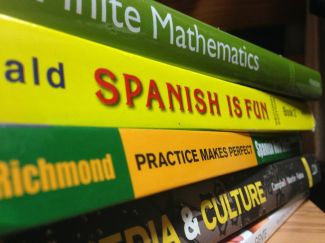By GIRISH SWAMINATH
STAFF WRITER

At the beginning of each semester, students find themselves repeatedly aghast at the towering costs of textbooks for their courses in the university bookstore. They ponder the reasons why textbook prices become higher year after year and express their frustration at the phenomenon.
“I should not have to pay $70 for a book [at the bookstore], when I could find it used on Amazon for $4.95,” Mike Chernichaw, FCRH ’14, said. “Maybe professors do not like using the bookstore since they tend to make incorrect orders for textbooks, but with students ordering books by themselves, the orders are often correct.”
Some students believe that the high prices of textbooks can be attributed to the increased demand for textbooks on college campuses.
“I think [textbooks] are so expensive simply because they can be,” Alison Silverman, FCRH ’14, said. “Students need to buy, or have at least some sort of access to, textbooks in order to do well in classes, so why not exploit that need and make prices super high?”
Students also feel that the prices of books are hiked, since students who purchase textbooks at the Fordham bookstore are likely to value immediate accessibility over cost.
“Fordham’s bookstore knows that the only kids who buy books there are price insensitive,” Daniel Svogun, FCRH ’14, said. “These are people who would rather know they can have new books immediately than buy them cheaply. Therefore, they can make the most money by raising the prices enough to make up the difference in lost customers who just order them via the Internet. It’s a strategy I believe [even] the music and film industry is using in response to rampant piracy, and judging by the recent report on revenue in those industries, it is one that works.”
A majority of students prefer to avoid even searching for the prices of textbooks at the Fordham bookstore.
“To be honest, I don’t even look at bookstore prices anymore,” Svogun said. “If at all possible I buy used back editions of any book I can, or I rent them, almost always whichever is cheaper. Occasionally used books will not show up, or be a bit worse than stated, but for 80-90 percent off it’s a risk I am willing to take.”
Students also choose to purchase books online to receive their orders in advance without having to worry about buying books at the start of the semester.
“If the bookstore has the lists available before the semester starts, I take advantage of that and get the books shipped before we go back, so it’s one less thing for me to worry about when classes start,” Elizabeth Green, FCRH ’14, said.
Professors attribute the high prices of textbooks to the fact that publishing costs are consistently rising and that some textbooks are targeted and marketed towards a small population of students.
“The economics of print publishing are very difficult, and have been getting that way progressively, not just because online [sales] are giving increased competition,” Allan Gilbert, chair of the department of anthropology and sociology, said. “Academic monographs written to document research can be very expensive to produce and have generally small target purchasers, even including academic libraries. Trade books, including textbooks, are designed to be marketed more broadly to students and thus represent a more lucrative corner of the business if the publisher can offer a good book by a prestigious author. I think it’s just the price of publishing in general, as the companies must make a profit to stay in the black.”
Some professors also believe that keeping textbooks updated in terms of editions increases the prices of textbooks.
“The fact that a new edition comes out every three to four years, in addition to the time and effort put forth into making texts as user-friendly as possible, makes textbooks expensive,” Gerard Iwantsch, associate chair for undergraduate studies in biology, said.
Professors tend to prefer using the most recent editions of textbooks to prior editions.
“The old editions quickly become impossible to find — at least in the numbers needed,” Iwantsch said. “Therefore, the most recent edition is required. Further, it is impractical to allow students to get whatever edition they can find. The confusion generated by attempting to use several editions is difficult to surmount.”
In academic departments at Fordham, instructors decide which textbooks to utilize for their courses and attempt to consider cost when choosing among several options of textbooks.
“In [the anthropology and sociology] department, instructors all choose their own books,” Gilbert said. “The department does not make any efforts to narrow their choices, even for introductory courses. Many professors do take cost into consideration if there are options. Within copyright rules, we also scan and place readings online within the university, so that more access can be had to texts without any required purchase. Our department in the social sciences generally has cheaper texts than the sciences, for example, but the prices can still be rather high if many books are involved.”
Academic departments deny the fact that publishers receive “kickbacks,” or additional funding, when professors mandate that students purchase textbooks for their courses.
“No one in [the anthropology and sociology] department gets anything from a publisher for using a particular textbook,” Gilbert said. “Lots of advertising and examination copies are sent our way, but no cash that I know of. It can happen, though, that a professor will accrue royalties if he or she assigns his or her own book as a required reading. That can be seen as self-aggrandizing and self-enriching, but it could also be entirely appropriate if the text is germane to the course.”
Regardless, students find ways to get books they need every semester, either by purchasing them more cheaply online, or resigning themselves to the bookstore.







































































































































































































TUNdiscounts • Dec 18, 2015 at 4:23 pm
See here how you can make money selling back textbooks (really): http://blog.tun.com/2015/12/17/the-secret-to-making-a-profit-selling-back-your-textbooks-seriously/